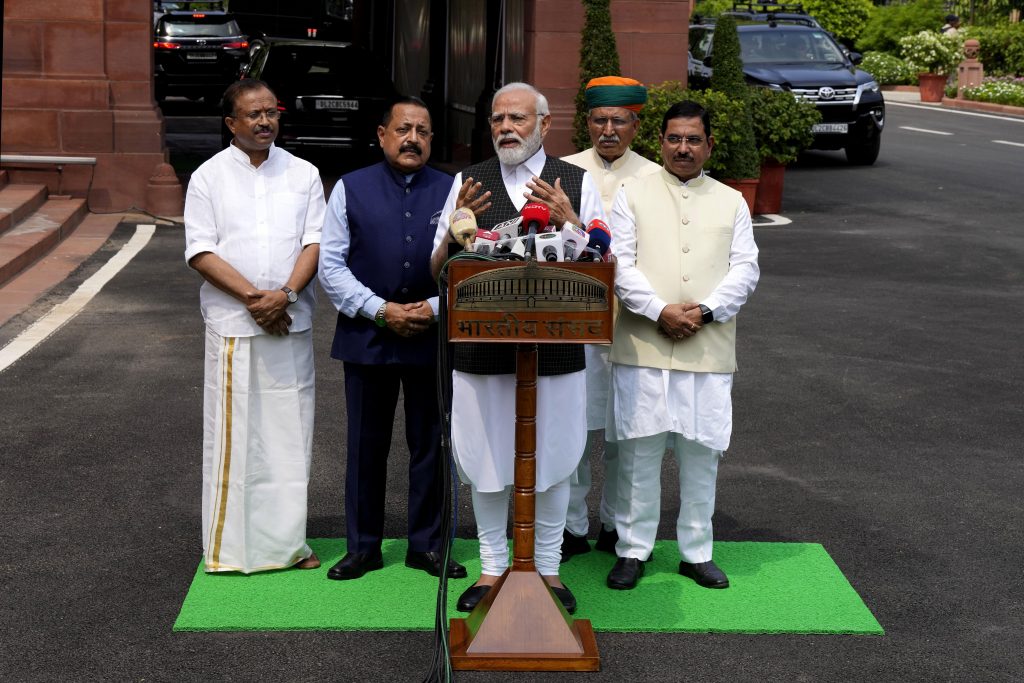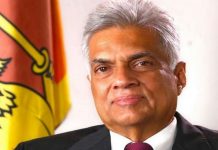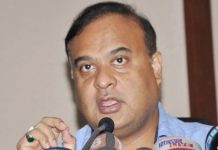
While the Modi government’s decision to hold a five-day special session of the Parliament starting on September 18 remains shrouded in mystery, let’s wait and watch which way the wind blows.
The avowed objective of the Modi government in promulgating the special session of the Parliament is shrouded in mystery. Whatever underlines this mystique behind the special session, let’s wait and watch the way the wind blows.
The Modi Government is known for hurling surprises from demonetization to promulgating a special session of the Parliament from September 18 to 22, an unprecedented move perhaps undertaken by any government in post-independent India thus far. In the absence of any clear official notification on the proposed agenda to be deliberated in the special session, only speculative reports hogging media headlines serve as the source of information for conjectures. Media reports have come to serve as the basis of speculations and explanations by political pundits and experts.
Some experts are of the opinion that the Modi government may want to appraise the Parliament with regard to the outcomes and implications of the ensuing G20 Summit scheduled to be held in New Delhi on September 8 and 9, an event that will bring together the global leaders of the world’s leading economies to deliberate on pressing issues such as climate change, health, and sustainable development.
Another chunk of political pundits avers that the forthcoming special session could focus on the Amrit Kaal, a nomenclature coined by PM Modi to mark the 75 anniversary of the independence of India, and according to these pundits, the Modi government could utilize the occasion to showcase its achievements and vision for the next 25 years of country’s development journey and endeavour to seek the support and cooperation of the Parliament and the people. However, keeping in view the past behaviour of the present dispensation, such an eventuality seems to be a remote possibility.
Nevertheless, some political observers have opined that the occasion of the proposed special session could be utilized by the Modi government as a political tool to counter the opposition’s opprobrium and allegations on multiple issues like the eruption of ethnic violence in Manipur and Adani issue, etc. A couple of experts have also pointed out that the occasion may be availed of by the Modi government as a symbolic gesture to facilitate the inauguration of the new Parliament building that was completed in May this year, thereby demonstrating its steadfast commitment to modernising and consolidating democracy and governance in the country.
Undeniably, a large chunk of experts is unanimous that the Modi government could utilize the special session to introduce some important bills and get them passed, and some of these proposed bills may either be constitutional amendments having bearing on the ensuing 2024 Lok Sabha elections or use the session to push through some of its flagship schemes or reforms that may find favour with the BJP’s core voters or elicit political support from new allies.
One Nation One Election
According to these experts, the Modi government may introduce during this special session the ‘One Nation One Election’ bill that could propose to conduct simultaneous elections to the Lok Sabha and all the state assemblies in the country, with the avowed objective of reducing the frequency, cost, and disruption of elections and to ensure continuity in policy and stability both at the Central and state levels. Concurrently, it is also argued that the bill could moot constitutional amendments to bring into line or synchronise the terms of the Lok Sabha and state assemblies, and to manage the scenarios such as premature dissolution, no-confidence motion, hung verdict, etc.
The notion of One Nation One Election is not a novel idea in India, which has seemingly garnered added traction in recent times, with PM Modi and his BJP stoutly supporting this concept while many opposition parties and dispassionate observers and critics opposing it on constitutional, legal and practical grounds. Actually. India witnessed four general elections from 1951 to 1967 being held simultaneously, which however got disrupted in the wake of the premature dissolution of certain state assemblies in 1968 and 1969 along with the subsequent dissolution of Lok Sabha in 1970, and since then, India could never have a concurrent election at the national and state levels.
Nonetheless, the notion of a One Nation One Election was revived in a suggestion by the then Election Commission of India in 1983 and also found endorsement by the Law Commission of India in 1996. With the assumption of power by PM Modi in 2014, this proposal gathered fillip and in 2016, the Niti Aayog brought out a working paper on the viability and desirability of simultaneous elections. On September 1, the Government of India announced the formation of an eight-member committee on One Nation One Election under the chairmanship of former President of India, Ram Nath Kovind. Other members of the committee include Amit Shah, Union Home Minister, Ghulam Nabi Azad, former MP, N.K. Singh, former Finance Commission Chairman, Subhash C. Kashyap, former SG of Lok Sabha, Harish Salve, senior advocate, Sanjay Kothari, former Chief Vigilance Commissioner, Arjun Ram Meghwar, Union Law Minister, Adhir Ranjan Chowdhury, Congress leader in Lok Sabha, and Niten Chandra, Legal Affairs Secretary to act as secretary to the committee. The Congress leader, Adhir Ranjan Chowdhury, however has not accepted the offer.
Meanwhile, some legal experts and critics are disinclined to subscribe to the concept of One Nation One Election on the plea that major constitutional amendments are needed to reconcile to the terms of the Lok Sabha and state assemblies, which are presently determined by different provisions such as Article 83 (2), Article 85 (2), Article 172 (1), Article 174 (4), etc. It is also argued that the implementation of the notion of a One Nation One Election would be detrimental to the federal structure and diversity of the country by affording an undue advantage to national parties relative to regional parties. While arguing that such a move entails the likelihood of compromising the democratic rights and choices of electorates, the critics aver that voters could be deprived of their right to exercise vote for a fresh mandate in the eventuality of a government losing its majority or confidence prior to the expiry of its tenure.
Critics also point to practical hurdles and challenges that may come in way for holding concurrent elections across such a vast and diverse country like India where the ECI would have to acquire and manage a massive number of electronic voting machines (EVMs), and Voter verifiable paper audit trail (VVPAT) machines which could augment the risk of technical glitches or dysfunction along with the problem of ensuring appropriate security arrangements and logistical support to conduct free and fair elections throughout the country. However, many experts feel that the Modi government may introduce a bill in this regard in the ensuing special session because the bill draft may not be ready and the newly set up committee cannot be expected to prepare such a draft in such a short time.
Other Bills
Many experts don’t rule out the probability of the introduction of bills such as the Uniform Civil Code (UCC) Bill and the Women’s Reservation Bill. The UCC aims at replacing personal laws, customs, and traditions with one common law for everyone irrespective of religion, creed, caste, and gender. The Women’s Reservation Bill is designed to reserve 33% of seats in the Lok Sabha and state assemblies for women candidates. Nevertheless, some experts are also sanguine about the Modi government focusing on introducing some other bills pertaining to its flagship programmes, reforms, and other measures to hoodwink the electorate and attract new allies through bills on farm laws, labour codes, education policy, or healthcare.
Conclusion
The avowed objective of the Modi government in promulgating the special session of the Parliament is shrouded in mystery in the absence of any reliable and authenticated official information and all surmises by experts or critics are based on speculations based on media reports. Some experts don’t rule out the possibility of the Modi Government calling the special session as a diversionary tactic to divert public and media attention from the political mileage being garnered by the Mumbai meeting of the INDIA alliance and the new revelations on Adani Group. Whatever underlines this mystique behind the special session, let’s wait and watch the way the wind blows.













